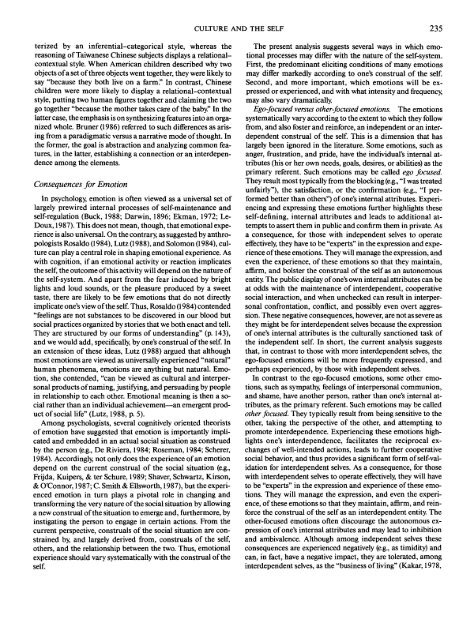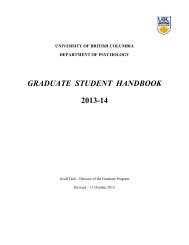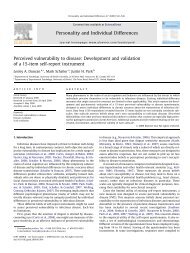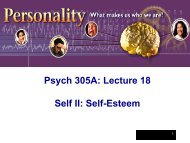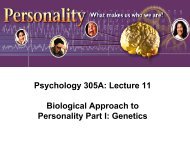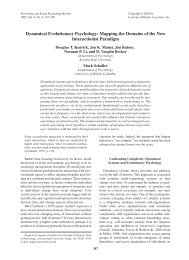Culture and the Self: Implications for Cognition, Emotion, and ... - iacmr
Culture and the Self: Implications for Cognition, Emotion, and ... - iacmr
Culture and the Self: Implications for Cognition, Emotion, and ... - iacmr
You also want an ePaper? Increase the reach of your titles
YUMPU automatically turns print PDFs into web optimized ePapers that Google loves.
CULTURE AND THE SELF 235<br />
terized by an inferential-categorical style, whereas <strong>the</strong><br />
reasoning of Taiwanese Chinese subjects displays a relationalcontextual<br />
style. When American children described why two<br />
objects of a set of three objects went toge<strong>the</strong>r, <strong>the</strong>y were likely to<br />
say "because <strong>the</strong>y both live on a farm." In contrast, Chinese<br />
children were more likely to display a relational-contextual<br />
style, putting two human figures toge<strong>the</strong>r <strong>and</strong> claiming <strong>the</strong> two<br />
go toge<strong>the</strong>r "because <strong>the</strong> mo<strong>the</strong>r takes care of <strong>the</strong> baby." In <strong>the</strong><br />
latter case, <strong>the</strong> emphasis is on syn<strong>the</strong>sizing features into an organized<br />
whole. Bruner (1986) referred to such differences as arising<br />
from a paradigmatic versus a narrative mode of thought. In<br />
<strong>the</strong> <strong>for</strong>mer, <strong>the</strong> goal is abstraction <strong>and</strong> analyzing common features,<br />
in <strong>the</strong> latter, establishing a connection or an interdependence<br />
among <strong>the</strong> elements.<br />
Consequences <strong>for</strong> <strong>Emotion</strong><br />
In psychology, emotion is often viewed as a universal set of<br />
largely prewired internal processes of self-maintenance <strong>and</strong><br />
self-regulation (Buck, 1988; Darwin, 1896; Ekman, 1972; Le-<br />
Doux, 1987). This does not mean, though, that emotional experience<br />
is also universal. On <strong>the</strong> contrary, as suggested by anthropologists<br />
Rosaldo (1984), Lutz (1988), <strong>and</strong> Solomon (1984), culture<br />
can play a central role in shaping emotional experience. As<br />
with cognition, if an emotional activity or reaction implicates<br />
<strong>the</strong> self, <strong>the</strong> outcome of this activity will depend on <strong>the</strong> nature of<br />
<strong>the</strong> self-system. And apart from <strong>the</strong> fear induced by bright<br />
lights <strong>and</strong> loud sounds, or <strong>the</strong> pleasure produced by a sweet<br />
taste, <strong>the</strong>re are likely to be few emotions that do not directly<br />
implicate one's view of <strong>the</strong> self. Thus, Rosaldo (1984) contended<br />
"feelings are not substances to be discovered in our blood but<br />
social practices organized by stories that we both enact <strong>and</strong> tell.<br />
They are structured by our <strong>for</strong>ms of underst<strong>and</strong>ing" (p. 143),<br />
<strong>and</strong> we would add, specifically, by one's construal of <strong>the</strong> self. In<br />
an extension of <strong>the</strong>se ideas, Lutz (1988) argued that although<br />
most emotions are viewed as universally experienced "natural"<br />
human phenomena, emotions are anything but natural. <strong>Emotion</strong>,<br />
she contended, "can be viewed as cultural <strong>and</strong> interpersonal<br />
products of naming, justifying, <strong>and</strong> persuading by people<br />
in relationship to each o<strong>the</strong>r. <strong>Emotion</strong>al meaning is <strong>the</strong>n a social<br />
ra<strong>the</strong>r than an individual achievement—an emergent product<br />
of social life" (Lutz, 1988, p. 5).<br />
Among psychologists, several cognitively oriented <strong>the</strong>orists<br />
of emotion have suggested that emotion is importantly implicated<br />
<strong>and</strong> embedded in an actual social situation as construed<br />
by <strong>the</strong> person (e.g., De Riviera, 1984; Roseman, 1984; Scherer,<br />
1984). Accordingly, not only does <strong>the</strong> experience of an emotion<br />
depend on <strong>the</strong> current construal of <strong>the</strong> social situation (e.g.,<br />
Frijda, Kuipers, & ter Schure, 1989; Shaver, Schwartz, Kirson,<br />
& O'Connor, 1987; C. Smith & Ellsworth, 1987), but <strong>the</strong> experienced<br />
emotion in turn plays a pivotal role in changing <strong>and</strong><br />
trans<strong>for</strong>ming <strong>the</strong> very nature of <strong>the</strong> social situation by allowing<br />
a new construal of <strong>the</strong> situation to emerge <strong>and</strong>, fur<strong>the</strong>rmore, by<br />
instigating <strong>the</strong> person to engage in certain actions. From <strong>the</strong><br />
current perspective, construals of <strong>the</strong> social situation are constrained<br />
by, <strong>and</strong> largely derived from, construals of <strong>the</strong> self,<br />
o<strong>the</strong>rs, <strong>and</strong> <strong>the</strong> relationship between <strong>the</strong> two. Thus, emotional<br />
experience should vary systematically with <strong>the</strong> construal of <strong>the</strong><br />
self.<br />
The present analysis suggests several ways in which emotional<br />
processes may differ with <strong>the</strong> nature of <strong>the</strong> self-system.<br />
First, <strong>the</strong> predominant eliciting conditions of many emotions<br />
may differ markedly according to one's construal of <strong>the</strong> self.<br />
Second, <strong>and</strong> more important, which emotions will be expressed<br />
or experienced, <strong>and</strong> with what intensity <strong>and</strong> frequency,<br />
may also vary dramatically.<br />
Ego-focused versus o<strong>the</strong>r-focused emotions. The emotions<br />
systematically vary according to <strong>the</strong> extent to which <strong>the</strong>y follow<br />
from, <strong>and</strong> also foster <strong>and</strong> rein<strong>for</strong>ce, an independent or an interdependent<br />
construal of <strong>the</strong> self. This is a dimension that has<br />
largely been ignored in <strong>the</strong> literature. Some emotions, such as<br />
anger, frustration, <strong>and</strong> pride, have <strong>the</strong> individual's internal attributes<br />
(his or her own needs, goals, desires, or abilities) as <strong>the</strong><br />
primary referent. Such emotions may be called ego focused.<br />
They result most typically from <strong>the</strong> blocking (e.g., "I was treated<br />
unfairly"), <strong>the</strong> satisfaction, or <strong>the</strong> confirmation (e.g., "I per<strong>for</strong>med<br />
better than o<strong>the</strong>rs") of one's internal attributes. Experiencing<br />
<strong>and</strong> expressing <strong>the</strong>se emotions fur<strong>the</strong>r highlights <strong>the</strong>se<br />
self-defining, internal attributes <strong>and</strong> leads to additional attempts<br />
to assert <strong>the</strong>m in public <strong>and</strong> confirm <strong>the</strong>m in private. As<br />
a consequence, <strong>for</strong> those with independent selves to operate<br />
effectively, <strong>the</strong>y have to be "experts" in <strong>the</strong> expression <strong>and</strong> experience<br />
of <strong>the</strong>se emotions. They will manage <strong>the</strong> expression, <strong>and</strong><br />
even <strong>the</strong> experience, of <strong>the</strong>se emotions so that <strong>the</strong>y maintain,<br />
affirm, <strong>and</strong> bolster <strong>the</strong> construal of <strong>the</strong> self as an autonomous<br />
entity. The public display of one's own internal attributes can be<br />
at odds with <strong>the</strong> maintenance of interdependent, cooperative<br />
social interaction, <strong>and</strong> when unchecked can result in interpersonal<br />
confrontation, conflict, <strong>and</strong> possibly even overt aggression.<br />
These negative consequences, however, are not as severe as<br />
<strong>the</strong>y might be <strong>for</strong> interdependent selves because <strong>the</strong> expression<br />
of one's internal attributes is <strong>the</strong> culturally sanctioned task of<br />
<strong>the</strong> independent self. In short, <strong>the</strong> current analysis suggests<br />
that, in contrast to those with more interdependent selves, <strong>the</strong><br />
ego-focused emotions will be more frequently expressed, <strong>and</strong><br />
perhaps experienced, by those with independent selves.<br />
In contrast to <strong>the</strong> ego-focused emotions, some o<strong>the</strong>r emotions,<br />
such as sympathy, feelings of interpersonal communion,<br />
<strong>and</strong> shame, have ano<strong>the</strong>r person, ra<strong>the</strong>r than one's internal attributes,<br />
as <strong>the</strong> primary referent. Such emotions may be called<br />
o<strong>the</strong>r focused. They typically result from being sensitive to <strong>the</strong><br />
o<strong>the</strong>r, taking <strong>the</strong> perspective of <strong>the</strong> o<strong>the</strong>r, <strong>and</strong> attempting to<br />
promote interdependence. Experiencing <strong>the</strong>se emotions highlights<br />
one's interdependence, facilitates <strong>the</strong> reciprocal exchanges<br />
of well-intended actions, leads to fur<strong>the</strong>r cooperative<br />
social behavior, <strong>and</strong> thus provides a significant <strong>for</strong>m of self-validation<br />
<strong>for</strong> interdependent selves. As a consequence, <strong>for</strong> those<br />
with interdependent selves to operate effectively, <strong>the</strong>y will have<br />
to be "experts" in <strong>the</strong> expression <strong>and</strong> experience of <strong>the</strong>se emotions.<br />
They will manage <strong>the</strong> expression, <strong>and</strong> even <strong>the</strong> experience,<br />
of <strong>the</strong>se emotions so that <strong>the</strong>y maintain, affirm, <strong>and</strong> rein<strong>for</strong>ce<br />
<strong>the</strong> construal of <strong>the</strong> self as an interdependent entity. The<br />
o<strong>the</strong>r-focused emotions often discourage <strong>the</strong> autonomous expression<br />
of one's internal attributes <strong>and</strong> may lead to inhibition<br />
<strong>and</strong> ambivalence. Although among independent selves <strong>the</strong>se<br />
consequences are experienced negatively (e.g., as timidity) <strong>and</strong><br />
can, in fact, have a negative impact, <strong>the</strong>y are tolerated, among<br />
interdependent selves, as <strong>the</strong> "business of living" (Kakar, 1978,


